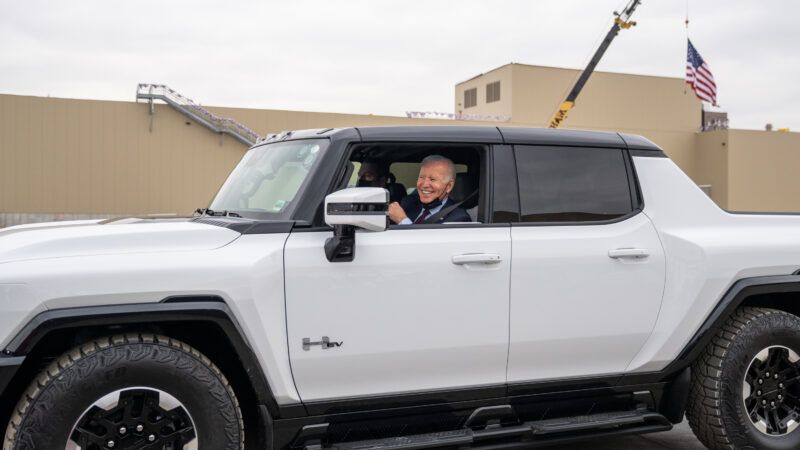Automakers Rethink E.V. Investments as Higher Labor Costs Hit
President Joe Biden's support for the United Auto Workers might have harmed his push for a faster transition to electric vehicles.

When President Joe Biden traveled to Michigan in September to walk the picket line with striking auto workers, he was praised for making a "powerful" gesture in support of the United Auto Workers (UAW) bid for higher pay.
By putting his presidential thumb on the scale, Biden might have helped tilt negotiations in favor of the UAW. At the same time, he seems to have inadvertently undermined one of his administration's big climate policy goals.
Ford and General Motors (G.M.), two of the three automakers that reached a deal with the UAW last month to end the strike, have announced plans this week to scale back future investments in electric vehicle (E.V.) production. Both companies have cited the higher labor costs created by the new union contract as a motivating factor for cutting costs, and E.V. production lines seem to be some of the top targets—perhaps not a surprise, given lackluster E.V. sales.
The new labor contract will cost Ford $8.8 billion through 2028, when it expires, and will add about $900 to the cost of each new vehicle, CNBC reported Thursday. During a call with investors this week, Chief Financial Officer John Lawler reportedly said that Ford would "find productivity and efficiencies and cost reductions throughout the company."
Separately, Ford has announced plans to postpone about $12 billion in planned investments in E.V. production. That includes punting on plans to build a battery production facility in Kentucky and postponing an expansion of a Michigan E.V. plant.
The story at G.M. appears to be pretty similar. New labor costs will total about $9.3 billion over the life of the UAW contract, and the company is planning to "fully offset the incremental costs of our new labour agreements," according to a CBC report this week. It looks like E.V. and self-driving vehicle production will take a significant hit.
This is pretty much exactly the trade-off that many people outside the White House expected. "The union is asking for more money and fewer hours as the industry transitions to E.V.s, but established companies are hemorrhaging money on the transition" despite getting generous government subsidies meant to stimulate E.V. production, Reason's Joe Lancaster wrote last month. In that environment, "Either UAW members can get a big raise, or automakers can push forward in the transition to electric vehicles."
The math is pretty irrefutable. Ford lost $4.5 billion on E.V.s this year and G.M. doesn't expect to turn a profit on them until at least 2025. When hit with higher labor costs, any business would first look to cut unprofitable or unsuccessful projects.
This looks like another version of the mistake the Biden administration made with solar panels. While the White House has ramped up subsidies to make rooftop solar panel installation more affordable, it has also maintained high tariffs on imported solar panels and their component parts—which has limited the availability of the very product the White House wants more Americans to be purchasing.
Trade-offs exist, even if you're unwilling to acknowledge them.


Show Comments (64)